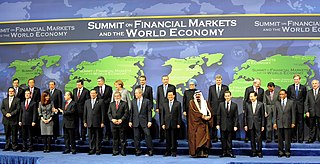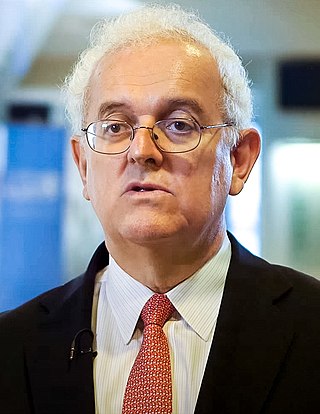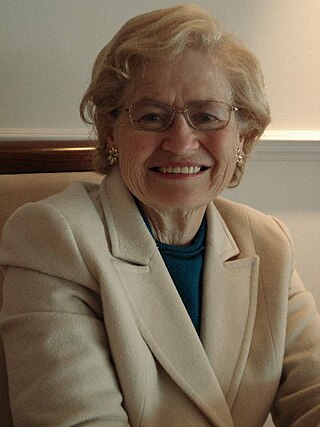Related Research Articles

The International Monetary Fund (IMF) is a major financial agency of the United Nations, and an international financial institution funded by 190 member countries, with headquarters in Washington, D.C. It is regarded as the global lender of last resort to national governments, and a leading supporter of exchange-rate stability. Its stated mission is "working to foster global monetary cooperation, secure financial stability, facilitate international trade, promote high employment and sustainable economic growth, and reduce poverty around the world."

The United Nations Economic and Social Council (ECOSOC) is one of the six principal organs of the United Nations, responsible for coordinating the economic and social fields of the organization, specifically in regards to the fifteen specialized agencies, the eight functional commissions, and the five regional commissions under its jurisdiction.

Joseph Eugene Stiglitz is an American New Keynesian economist, a public policy analyst, political activist, and a full professor at Columbia University. He is a recipient of the Nobel Memorial Prize in Economic Sciences (2001) and the John Bates Clark Medal (1979). He is a former senior vice president and chief economist of the World Bank. He is also a former member and chairman of the US Council of Economic Advisers. He is known for his support for the Georgist public finance theory and for his critical view of the management of globalization, of laissez-faire economists, and of international institutions such as the International Monetary Fund and the World Bank.

The global financial system is the worldwide framework of legal agreements, institutions, and both formal and informal economic action that together facilitate international flows of financial capital for purposes of investment and trade financing. Since emerging in the late 19th century during the first modern wave of economic globalization, its evolution is marked by the establishment of central banks, multilateral treaties, and intergovernmental organizations aimed at improving the transparency, regulation, and effectiveness of international markets. In the late 1800s, world migration and communication technology facilitated unprecedented growth in international trade and investment. At the onset of World War I, trade contracted as foreign exchange markets became paralyzed by money market illiquidity. Countries sought to defend against external shocks with protectionist policies and trade virtually halted by 1933, worsening the effects of the global Great Depression until a series of reciprocal trade agreements slowly reduced tariffs worldwide. Efforts to revamp the international monetary system after World War II improved exchange rate stability, fostering record growth in global finance.
The Washington Consensus is a set of ten economic policy prescriptions considered to constitute the "standard" reform package promoted for crisis-wracked developing countries by Washington, D.C.-based institutions such as the International Monetary Fund (IMF), World Bank and United States Department of the Treasury. The term was first used in 1989 by English economist John Williamson. The prescriptions encompassed free-market promoting policies such as trade liberalization, privatization and finance liberalization. They also entailed fiscal and monetary policies intended to minimize fiscal deficits and minimize inflation.
John Harold Williamson was a British-born economist who coined the term Washington Consensus. He served as a senior fellow at the Peterson Institute for International Economics from 1981 until his retirement in 2012. During that time, he was the project director for the United Nations High-Level Panel on Financing for Development in 2001. He was also on leave as chief economist for South Asia at the World Bank during 1996–99, adviser to the International Monetary Fund from 1972 to 1974, and an economic consultant to the UK Treasury from 1968 to 1970. He was also an economics professor at Pontifícia Universidade Católica do Rio de Janeiro (1978–81), University of Warwick (1970–77), Massachusetts Institute of Technology, University of York (1963–68) and Princeton University (1962–63).

Globalization and Its Discontents is a book published in 2002 by the 2001 Nobel laureate Joseph E. Stiglitz. The title is a reference to Freud's Civilization and Its Discontents.

Heidemarie Wieczorek-Zeul is a German politician and a member of the Social Democratic Party (SPD) since 1965.

Jomo Kwame Sundaram is a Malaysian economist. He is a senior adviser at the Khazanah Research Institute, visiting fellow at the Initiative for Policy Dialogue, Columbia University, and an adjunct professor at the International Islamic University (IIUM).

The School of International and Public Affairs (SIPA) is the international affairs and public policy school of Columbia University, a private Ivy League university located in Morningside Heights, Manhattan, New York City. SIPA offers Master of International Affairs (MIA) and Master of Public Administration (MPA) degrees in a range of fields, as well as the Executive MPA and PhD program in Sustainable Development.

The United Nations Peacebuilding Commission (PBC) is a United Nations intergovernmental advisory body of both the General Assembly and the Security Council that supports peace efforts in conflict affected countries. A key addition to the capacity of the international community in the broad peace agenda, it was established in 2005 with the passage of both A/RES/60/180 and S/RES/1645 Mr. Sérgio França Danese (Brazil) is the incumbent chair of the PBC.

The 2008 G20 Washington Summit on Financial Markets and the World Economy took place on November 14–15, 2008, in Washington, D.C., United States. It achieved general agreement amongst the G20 on how to cooperate in key areas so as to strengthen economic growth, deal with the 2008 financial crisis, and lay the foundation for reform to avoid similar crises in the future. The Summit resulted from an initiative by the French and European Union President, Nicolas Sarkozy, Australian Prime Minister Kevin Rudd, and the British Prime Minister, Gordon Brown. In connection with the G7 finance ministers on October 11, 2008, United States President George W. Bush stated that the next meeting of the G20 would be important in finding solutions to the economic crisis. Since many economists and politicians called for a new Bretton Woods system to overhaul the world's financial structure, the meeting has sometimes been described by the media as Bretton Woods II.

The United Nations University World Institute for Development Economics Research (UNU-WIDER) is part of the United Nations University (UNU). UNU-WIDER, the first research and training centre to be established by the UNU, is an international academic organization set up with the aim of promoting peace and progress by bringing together leading scholars from around the world to tackle pressing global problems.
The Commission of Experts on Reforms of the International Monetary and Financial System, chaired by Joseph Stiglitz and not to be confused with the concurrent Commission on the Measurement of Economic Performance and Social Progress he also chaired, was convened by the President of the United Nations General Assembly, Miguel d'Escoto Brockmann, "to review the workings of the global financial system, including major bodies such as the World Bank and the IMF, and to suggest steps to be taken by Member States to secure a more sustainable and just global economic order".
Stiglitz Commission is a short name given for two commissions led by the US economist Joseph E. Stiglitz:

Jean-Paul Fitoussi was a French economist and sociologist of Sephardi Jewish descent.

José Antonio Ocampo Gaviria is a Colombian writer, economist and academic who was the professor of professional practice in international and public affairs and director of the Economic and Political Development Concentration at the School of International and Public Affairs at Columbia University from July 2007 to August 2022. Prior to his appointment, Ocampo served in a number of positions in the United Nations and the Government of Colombia, most notably in the United Nations as Under-Secretary-General for Economic and Social Affairs and Executive Secretary for the Economic Commission for Latin America and the Caribbean, and in Colombia as Minister of Finance and Public Credit and Minister of Agriculture and Rural Development.

Yaga Venugopal Reddy is an Indian economist and a retired Indian Administrative Service (IAS) officer of the 1964 batch belonging to Andhra Pradesh cadre. Reddy served as governor of the Reserve Bank of India (RBI), India's central bank, from September 2003 until September 2008.

Stephany Griffith-Jones is an economist specializing in international finance and development. Her expertise lies in the reform of the international financial system, particularly in financial regulation, global governance, and international capital flows. Currently, she serves as a member of the Governor Board at the Central Bank of Chile. She has held various positions throughout her career, including financial markets director at the Initiative for Policy Dialogue based at Columbia University, associate fellow at the Overseas Development Institute, and professorial fellow at the Institute of Development Studies at Sussex University.

The Astana International Forum (AIF) is an international and regional platform for dialogue and a nonprofit organization headquartered in Astana, Kazakhstan. Previously called the Astana Economic Forum, it has been organized by the Government of Kazakhstan since 2008. The name change reflects the broader range of topics discussed at the forum, such as climate, food and energy security and is intended to draw of attendees from around the world. The Forum is organized by the Government of Kazakhstan, which includes the Economic Research Institute, Ministry of National Economy and Ministry of Foreign Affairs. A meeting is held each year in Astana in which more than eight thousand delegates from one hundred countries are brought together: they include chief executive officers, politicians, journalists, scientists and Nobel Prize laureates.
References
- ↑ The Stiglitz Report. New York: The New Press. 2010. ISBN 978-1595585202.